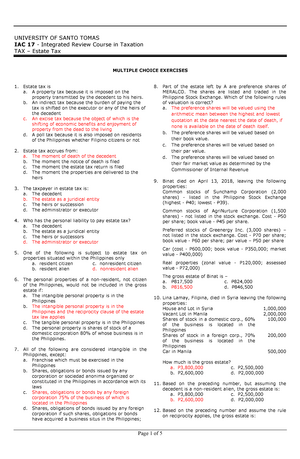- Information
- AI Chat
Was this document helpful?
Income TAX ON Estates Trusts Partnerships Joint Ventures AND CO- Ownership UST
Course: Accountancy (BSA2)
729 Documents
Students shared 729 documents in this course
University: Quezon City University
Was this document helpful?

INCOME TAX ON ESTATES AND TRUSTS
A. TAXABILITY OF ESTATES
An estate pertains to all the property, rights and obligations of a deceased person, including those that accrue since the opening of succession.
Taxability:
An estate is taxable DURING judicial settlement, that is, during the time the estate is the subject of judicial testamentary or intestate proceedings.
Estates are taxed similar to an individual, so the rules on taxable income, those subject to final tax, capital gains tax, the deductions and the rates are similar,
EXCEPT:
1. An estate is required to obtain its own Tax Identification Number (TIN).
2. Distribution of the INCOME to the heirs shall be deductible for purposes of computing taxable income. Such distribution shall be subject to a 15%
withholding tax and will be reported by the heir as part of his personal taxable income.
Personal Exemption:
of 20,000 provided under Sec. 62 has been repealed under the TRAIN.
Period to start:
The estate is taxed only on its income from the death of the decedent. Any income for the year which was earned prior to death is reported
separately in the individual’s income tax return for the year.
Not under JUDICIAL settlement:
An estate NOT under judicial settlement shall be treated as a co-ownership for tax purposes or if the heirs actively participated
in its management or invested additional capital thereto, it may be considered a partnership, taxable as such.
Liability to pay the income tax:
the administrator or executor will be liable to pay the income tax liability of the estate.
B. TAXABILITY OF TRUSTS
A trust is the arrangement created by will or an arrangement under which title to property is passed to another for consideration or investment with the income
therefrom and ultimately the corpus to be distributed in accordance with the directions of the creator as expressed in the governing instrument.
Parties
to a trust include the
trustor,
the one who establishes the trust; the
trustee
, the one in whom confidence is reposed as regards the property for the
benefit of another person; and the
beneficiary
, for whose benefit the trust has been established.
Kinds of trust:
1. Revocable – one where at any time the power to revest (return) in the grantor title to any art of the corpus of the trust is vested; the trust is not considered
a separate taxable entity and the income from the corpus forms part of the taxable income of the grantor.
2. Irrevocable – where no such right exists or cannot be exercised after an agreed period; Here, the trust itself is considered a separate taxable entity from
the grantor, and is taxed similar to an estate under judicial settlement and similarly entitled to a P20,000 basic personal exemption.
Rules on Taxability:
1. If the income is distributed regularly, such will form part of the taxable income of the beneficiary.
2. If the trust is
revocable
, the income of the trust forms part of the taxable income of the trustor.
3. Only when the trust is
irrevocable
and the income is kept in the trust, would there be a need to compute for the income tax liability of the Trust.
4. If the Trust is treated as a separate taxable unit,
the rules on individuals are the same, except
that the Distribution of INCOME to the beneficiary
shall be deductible for purposes of computing the taxable income of the Trust subject to 15% withholding tax, and the amount distributed (gross of the
withholding tax) will form part of the beneficiary’s taxable income.
Personal Exemption:
of 20,000 provided under Sec. 62 has been repealed under the TRAIN.
ILLUSTRATION: G transferred property to F, in trust, and under the terms of the transfer, F should accumulate the income for the benefit of B until the latter
reaches the age of majority. During 2016, the property earned P1,000,000 and incurred expenses of P350,000. P50,000 of the income was distributed to B.
How much is income tax?
Gross Income
P1,000,000
Less: Deductions for:
Expenses
350,000
Distribution of income to beneficiary
50,000
Exemption
0
400,000
Taxable Income
600,000
Income Tax
P 80,000
1. In the above illustration, G is known as the Grantor, F is known as the Fiduciary, B is known as the Beneficiary.
2. Income distribution to the beneficiary and income set aside or applied for his benefit shall be deductible for the computation of the taxable income of the
trust. (similar to an Estate)
3. The income distributed is subject to a 15% creditable withholding tax. Accordingly, B will receive P42,500 cash, net of the related withholding tax of P7,500
(P50,000 * 15%). The amount to be included in B’s taxable income is still P50,000 with a tax credit of P7,500. (similar to an Estate)
4. The Fiduciary is the one liable to file the income tax return for trusts held.
5. Note that Estates and Trusts are no longer entitled to the P20,000 exemption.
Two or more Trusts:
In the event that a Fiduciary holds two or more trusts from the
same grantor
with the
same beneficiary
, the income tax shall be consolidated
for such trusts. Accordingly, the gross income and deductions are consolidated as if they are from one property.
INCOME TAX ON PARTNERSHIPS, JOINT VENTURES and CO-OWNERSHIPS
TAXABILITY OF PARTNERSHIPS AND PARTNERS:
KINDS OF PARTNERSHIPS














